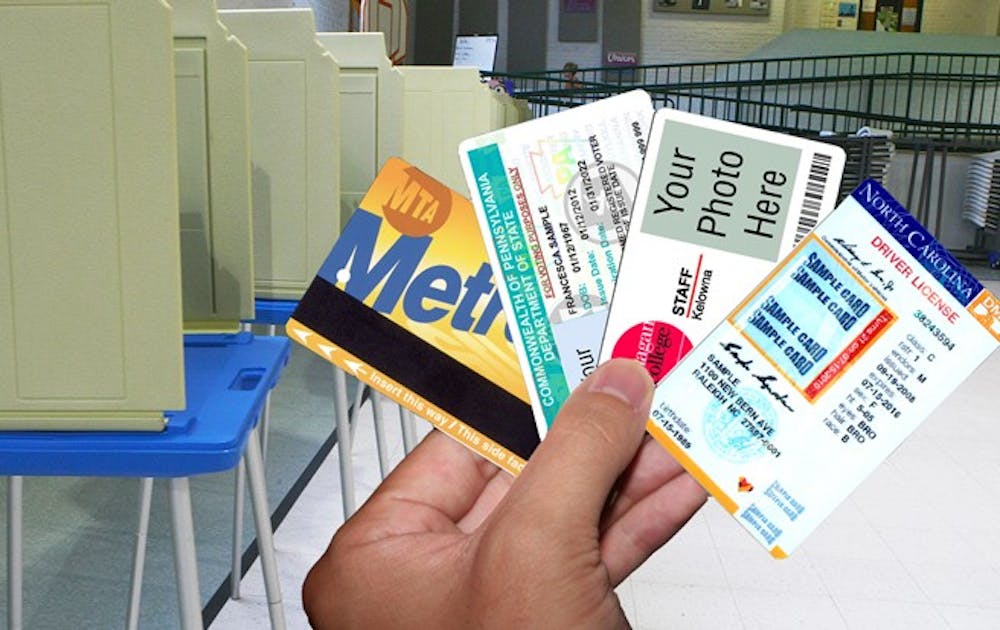As many as 613,000 North Carolina voters may be unable to cast ballots if a voter ID law moves through the state legislature.
Republican lawmakers in the North Carolina legislature are discussing changes to the state’s voting laws, namely a new requirement for voters to show valid state-issued identification at the election polls. Although no specific bill has been proposed yet, experts say that Duke students, many of whom are from out of state, may experience significant changes to their voting rights.
“A photo ID requirement might not seem like that big of a deal to most of us, but the fact of the matter is that democracy and our voter rights is not about most of us, it’s about everybody,” said Bryan Warner, director of communications for the North Carolina Center for Voter Education. “We need to… ensure that we’re not disenfranchising anyone.”
Although the precise provisions of the anticipated bill remain uncertain, Bob Hall, executive director of Democracy North Carolina—a nonpartisan democracy advocacy group that works to increase voter participation—said that the legislation will likely be similar to the “Restore Confidence in Government” bill. That bill, which passed the House and Senate before it was vetoed by then-Gov. Bev Perdue last June, would have required all voters to provide either a North Carolina driver’s license or state photo identification in order to vote.
Since his election to office, Republican Gov. Pat McCrory has supported the movement toward establishing voter ID laws. McCrory has since indicated, however, that he would be receptive to considering a bill that calls for other forms of identification, such as voter registration cards.
“I still would like [a] photo on it but I’d also be willing to accept other options,” McCrory told reporters during a visit to the General Assembly.
Republican Rep. Frank Iler, a co-sponsor of the vetoed bill last year, emphasized the GA’s focus on voter ID laws in the current session, adding that the bill would tighten voting procedures and eliminate double voting.
“The new session will focus on the economy, regulatory reform and the ‘Voter ID’ bill, which will be item number one on the table,” he told The State Port Pilot.
The new proposal, though, may be more flexible than the last regarding the types of photo identification accepted at the polls, Hall said.
For example, students may be able to use public university IDs, said Anita Earls, executive director of the Southern Coalition for Social Justice. She noted, though, that IDs from private institutions like Duke may remain invalid, as they are not issued by the state. Such could hurt many Duke students who are not residents of North Carolina—90 percent of the Class of 2016 is from out of state.
A new report from the State Board of Elections published last month revealed that 613,000 registered North Carolina voters may not have the necessary identification card or state-issued driver’s license required by the discussed legislation. The study compared state voter registration records with state DMV records.
With 9 percent of the North Carolina voting base implicated, voter ID laws could disproportionately affect certain segments of the voter population. Women who have changed their names, senior citizens and black voters would be most affected, Hall said.
Fifty-three percent of the implicated voters are Democrats, 25 percent are over the age of 65 and 30 percent are black, according to the report.
Given the Republican control of both the legislature and the governor’s mansion, whatever bill is introduced will likely be passed, Hall said. The new proposal is expected to be submitted by the end of this month. “They have the numbers to pass anything they want—that’s not the question anymore,” Hall said. “Whether it stands up to legal challenge, that is more difficult.”
Hall added that Republican lawmakers are discussing the possibility of phasing in the new voter ID laws before implementing full restrictions in 2016. Under this model, voters would be asked for photo ID in 2014, but would not be turned away. After the 2016 cutoff, all polls would be closed to voters without valid identification.
“We encourage lawmakers to make sure that any legislation takes steps to not disenfranchise voters in the state,” he said.
Republican lawmakers responsible for both the old bill and the anticipated one cite eliminating voter fraud as a major motivation.
But the prevalence of voter fraud in the state is in question, said Earls, who added that the illegal activity was not a problem in the state.
“There is no voter fraud to begin with…. It’s a huge waste of state money during a time when we should be focusing on education and the economy,” Earls said of a possible voter ID law.
The state currently requires voters to provide their social security numbers or driver’s license numbers to confirm their identity. Such security measures have proven to be effective, Warner said, adding that the new laws would do little more than “obstruct law-abiding citizens from participating in the democratic process.”
Get The Chronicle straight to your inbox
Sign up for our weekly newsletter. Cancel at any time.
Earls also questioned the efficacy of any voter ID legislation in curbing potential voter fraud. If an individual is determined to commit perjury, that individual could easily procure a fabricated state photo ID, she said. Hall pointed to partisan motivations behind the push for voter ID legislation, rejecting Republican lawmakers’ claims that the legislation would secure the voting system.
“It won’t make voting more secure—that’s a myth,” Hall said.
He noted that the last Republican proposed bill failed to address security measures for mail-in ballots, which evidence suggests fosters more voter fraud than in-person voting.
“That’s a tip-off to what this is really about,” Hall said. “If they were actually concerned, they would’ve made sure that their legislation addressed more documentation for people using mail to send in their ballot.”

